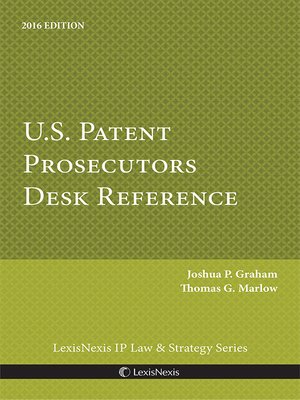
Sign up to save your library
With an OverDrive account, you can save your favorite libraries for at-a-glance information about availability. Find out more about OverDrive accounts.
Find this title in Libby, the library reading app by OverDrive.



Search for a digital library with this title
Title found at these libraries:
| Library Name | Distance |
|---|---|
| Loading... |
U.S. Patent Prosecutor's Desk Reference, 2016 Edition by Joshua P. Graham & Thomas G. Marlow, assists patent prosecutors in responding to Office Actions issued by the United States Patent and Trademark Office (USPTO) rejecting patent application claims. It is a quick, reliable reference to assist prosecutors in creating, researching, and supporting patentability arguments.
Each section of the reference work includes the basis for the rejection, responses to the rejection, and legal authority supporting the responses. The 2016 Edition offers comprehensive and updated sources of law that correspond to recent rejections made by the USPTO.
Features include:
After reviewing Graham & Marlow's new desk reference for patent prosecution, I kept asking myself why no one had ever published anything like this before. In short, this is an absolutely wonderful resource for patent prosecutors who need to quickly draft effective and authoritative responses to a myriad of different USPTO rejections. You can either spend hours delving through a confusing array of regulations and court decisions, or you can pick up this desk reference and get the guidance and authorities you need for most prosecution questions in less than two minutes. I would strongly recommend it for any prosecutor. — Steven W. Lundberg, Patent attorney and a founding partner of Schwegman, Lundberg & Woessner
The U.S. Patent Prosecutor's Desk Reference is an essential practice guide for every patent attorney. It is much easier to rebut an Examiner's rejection when you have at your fingertips a collection of decisions by the CAFC, CCPA and BPAI in which the Examiner's rejection was reversed. Because these decisions are organized by rejection type, you can quickly find authority to bolster your argument that a particular rejection is improper. Using this reference will make even experienced patent prosecutors more efficient and effective. — Ann McCrackin, Professor of Law and Director of the Patent Prosecution Program, University of New Hampshire School of Law (formerly Franklin Pierce Law Center)
The eBook versions of this title feature links to Lexis Advance for further legal research options.







